
A groundbreaking FDA-approved trial just proved that one 100-microgram dose can do what years of traditional therapy couldn’t—without a single counseling session.
Wait, Did You Just Say LSD Cures Anxiety?
Psychedelic Medicine Research Milestones
I know what you’re thinking.
“Great, another clickbait headline about magic mushrooms.”
“Probably some sketchy study with 10 college students in someone’s basement.”
Trust me, I thought the same thing. But then I saw the numbers. And the source. And honestly? It stopped me dead in my tracks.
This isn’t some fringe research. We’re talking about MindMed’s MM120 clinical trial—198 participants, FDA oversight, and results so impressive that the notoriously conservative FDA fast-tracked the entire program with “Breakthrough Therapy” status.
Here’s the kicker: 48% of patients with severe anxiety achieved complete remission after a single dose. And it lasted 12 weeks.
No daily pills. No therapy sessions. One dose. Done.
Your Current Anxiety Meds Are Probably Failing You
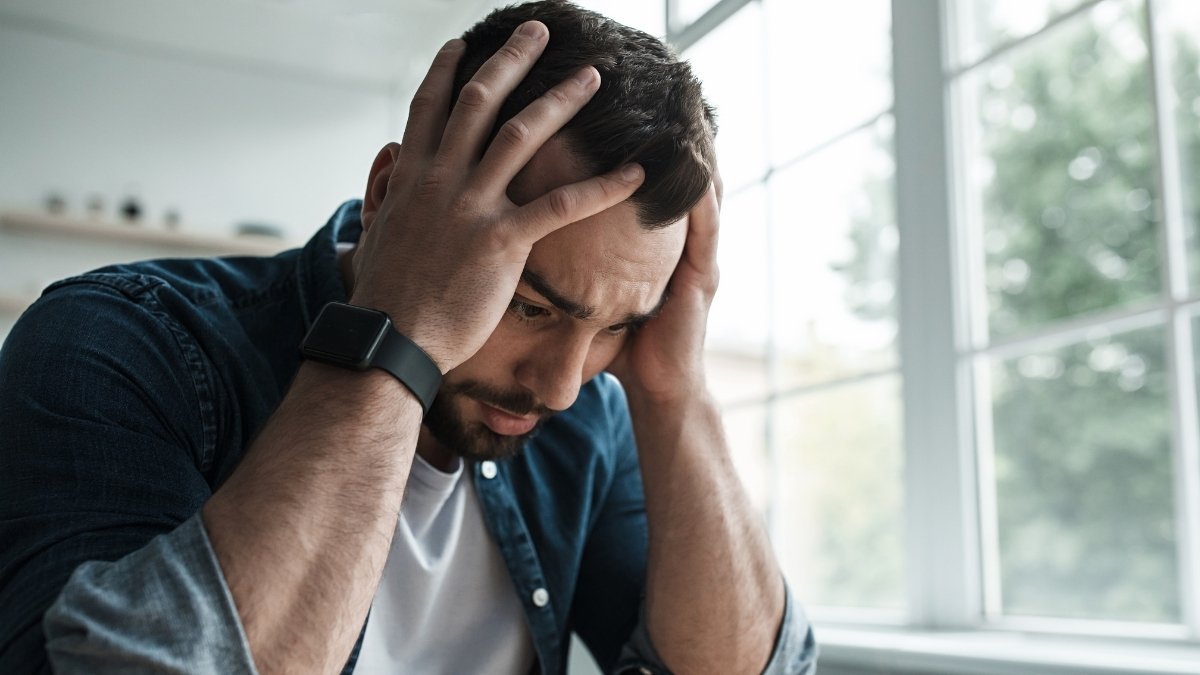
Let me hit you with some uncomfortable truths about anxiety treatment.
The success rate of current anxiety medications? Pathetic.
Only 30-50% of people respond to first-line treatments like Lexapro, Cymbalta, or Effexor. And “respond” just means you feel 50% better—not cured, not thriving, just… less miserable.
But here’s the real gut punch: Even among people who do respond, only about half achieve actual recovery.
Do the math. We’re looking at a real success rate of 15-25%.
Meanwhile, you’re dealing with:
- Sexual dysfunction
- Weight gain
- Emotional numbness
- Months of dose adjustments
- Side effects that sometimes feel worse than the anxiety itself
And that’s considered “standard care.”
The 6.8 Million People Left Behind

Here’s what really gets me fired up about this.
Generalized anxiety disorder affects 6.8 million American adults. That’s more people than live in Arizona.
Yet only 43% are getting treatment. Why? Because the system is broken.
The biggest barriers people report?
- “I want to solve this myself” (translation: “I don’t trust these treatments”)
- Cost (because who can afford $400 therapy sessions?)
- Shame (because seeking help still feels like failure)
Can you blame them? When your doctor offers you a medication that might work for some people some of the time, with a laundry list of side effects… yeah, I’d try to tough it out too.
This is the landscape MindMed just disrupted.
Plot Twist: LSD Used to Be Your Doctor’s Go-To

Here’s a wild piece of history you probably don’t know.
From 1950 to 1965, LSD wasn’t some hippie drug. It was legitimate medicine.
We’re talking:
- Over 1,000 scientific papers
- Six international conferences
- 40,000+ patients treated successfully
- Major medical centers use it as standard care
Albert Hofmann, the Swiss chemist who discovered LSD in 1943, never intended it for recreational use. After his famous “Bicycle Day” trip, he couldn’t anyone wanting that experience just for fun.
Sandoz literally marketed it as “Delysid”—a prescription medication for anxiety disorders.
Then came Timothy Leary. “Turn on, tune in, drop out.” Media hysteria. Nixon’s War on Drugs.
By 1970, it was all over. Five decades of promising research… gone.
If we’d never stopped. Where anxiety treatment might be today. Well, we’re about to find out.
The Study That Changes Everything
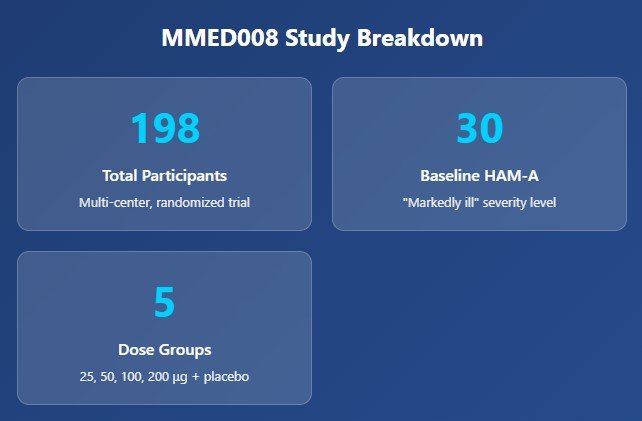
Let me walk you through exactly what MindMed did—and why it’s so revolutionary.
The Setup Was Hardcore
198 participants with severe generalized anxiety disorder. We’re not talking about people who get nervous before job interviews. These folks had Hamilton Anxiety scores around 30—that’s “markedly ill” territory.
The kind of anxiety that destroys lives.
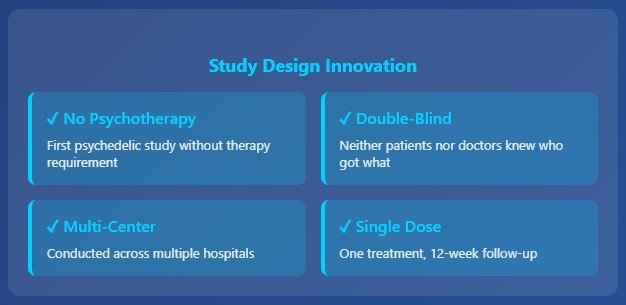
They were randomly split into groups getting 25, 50, 100, or 200 micrograms of MM120 (MindMed’s pharmaceutical-grade LSD) or a placebo.
Here’s the Game-Changing Part
No therapy required.
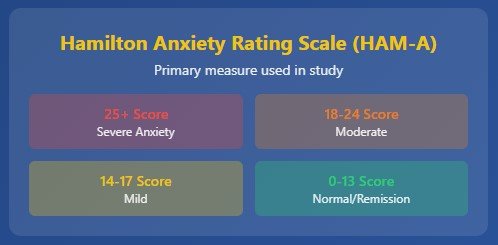
Read that again. Unlike every other psychedelic study you’ve heard about, patients didn’t need:
- Guided therapy sessions
- Integration counseling
- Specially trained therapists
- Months of preparation
Just the medicine. That’s it.
As Dr. Reid Robison, one of the lead investigators, put it: “I applaud the way this study was designed by MindMed to isolate the effect of MM120 by removing confounding variables like additional medications and psychotherapy.”
The Results Will Blow Your Mind

48% achieved complete remission at 12 weeks.
Not “felt better.” Not “improved symptoms.” Complete remission.
65% showed significant clinical improvement.
But here’s what really gets me: The effects got stronger over time. Patients continued improving between weeks 4 and 12.
This isn’t a temporary Band-Aid. It’s a genuine brain change.
What “48% Remission” Actually Means for You
MM120 vs. Traditional Treatments
Clinical Global Impression Scores
Let me put this in perspective.
When Big Pharma runs trials for new anxiety drugs, they throw a party if they beat placebo by 10-15%. A 20% improvement over sugar pills? That’s marketing gold.
MindMed hit 48% complete remission.
Here’s what that looks like in real life:
Before MM120: You’re checking your phone obsessively, your mind racing with worst-case scenarios, your chest tight with that familiar dread. Sleep is elusive. Concentration is shot. You’re avoiding social situations because small talk feels impossible.
After MM120: You wake up, and your first thought isn’t worry. You can focus on work. Social interactions feel natural again. The constant background hum of anxiety? Gone.
That’s what clinical remission means. Getting your life back.
The “No Therapy” Revolution Is About to Change Healthcare

This is where things get really interesting.
Every other psychedelic therapy program requires extensive therapy support:
- MAPS’ MDMA for PTSD: 40+ hours of therapy per patient
- Compass Pathways’ psilocybin: Multiple preparation and integration sessions
- Specialized treatment centers with custom training and licensing
MindMed just proved you don’t need any of that.
What This Means for You
Accessibility: Your regular family doctor could potentially prescribe this. No need to find specialized psychedelic therapy centers.
Cost: Instead of months of expensive therapy sessions, you’re looking at a single treatment day.
Scalability: We could actually treat the millions of people who need help, instead of the lucky few who can afford boutique psychedelic therapy.
Speed: No waiting lists for specialized therapists. No months of preparation.
This could democratize mental healthcare in a way we’ve never seen.
The Science Is Actually Pretty Cool

So how does one dose create lasting change?
MM120 targets your brain’s serotonin-2A receptors—the same system that’s disrupted in anxiety disorders.
Think of it like this: Your anxious brain has developed rigid, destructive thought patterns. It’s like water flowing down the same eroded channels over and over, getting deeper each time.
LSD temporarily floods the system, allowing those rigid channels to soften and new, healthier patterns to form.
As Hofmann himself described it, LSD creates “an inner joy, an open mindedness, a gratefulness, open eyes and an internal sensitivity for the miracles of creation.”
But you don’t need mystical experiences to get better. The therapeutic benefits seem to come from this neuroplasticity reset—your brain’s ability to form new, healthier patterns.
“But Isn’t LSD Dangerous?”
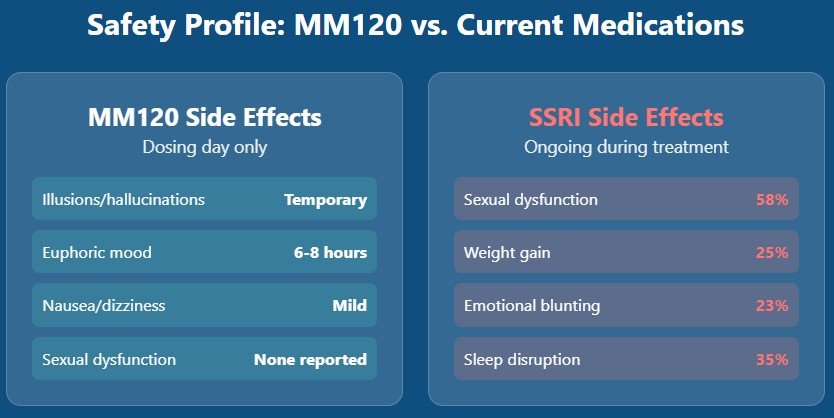
I get it. You’ve been told your whole life that LSD will make you think you can fly and jump off buildings.
Let’s separate fact from fiction.
The Safety Profile
MM120 was well-tolerated in trials. Most side effects were:
- Mild to moderate
- Happened only on treatment day
- Resolved within hours
Common effects included illusions, euphoric mood, some anxiety (during the experience), tingling, dizziness, and nausea.
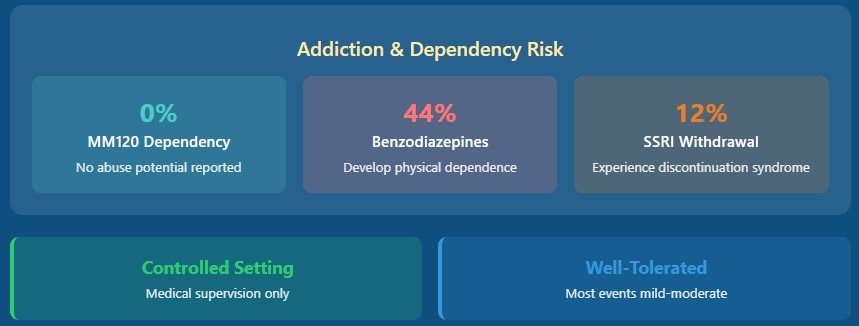
Notice what’s missing? Long-term side effects. Sexual dysfunction. Weight gain. Emotional numbing.
Compare that to your current SSRI.
The Dosing Is Precise
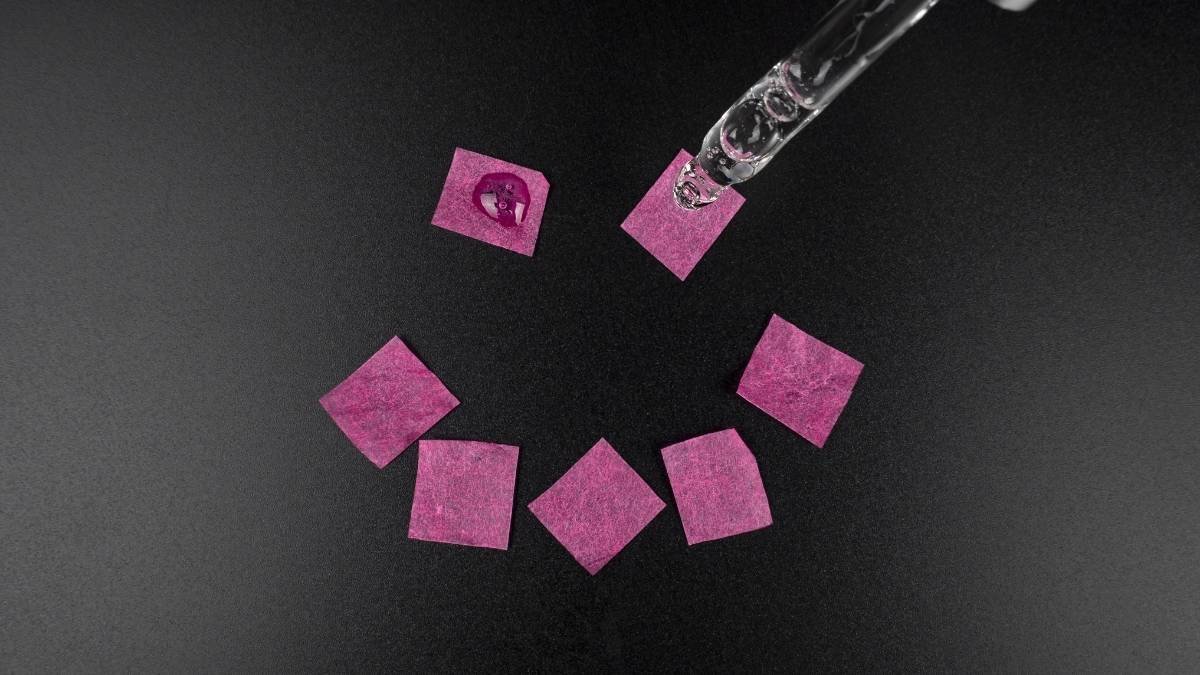
Hofmann noted that LSD “could be dangerous if misused, because a relatively high dose of 500 micrograms has an extremely powerful psychoactive effect.”
MindMed’s therapeutic doses? 100-200 micrograms. Far below dangerous levels, administered in controlled medical settings.
The Addiction Question
Here’s the fascinating part: Nobody wanted to abuse MM120.
The experience, while therapeutic, isn’t typically described as fun or recreational. Combined with the lasting effects, there’s no motivation for repeated use.
When was the last time you heard of someone getting addicted to a medication that works so well they only need it once?
The Economics Will Shock You
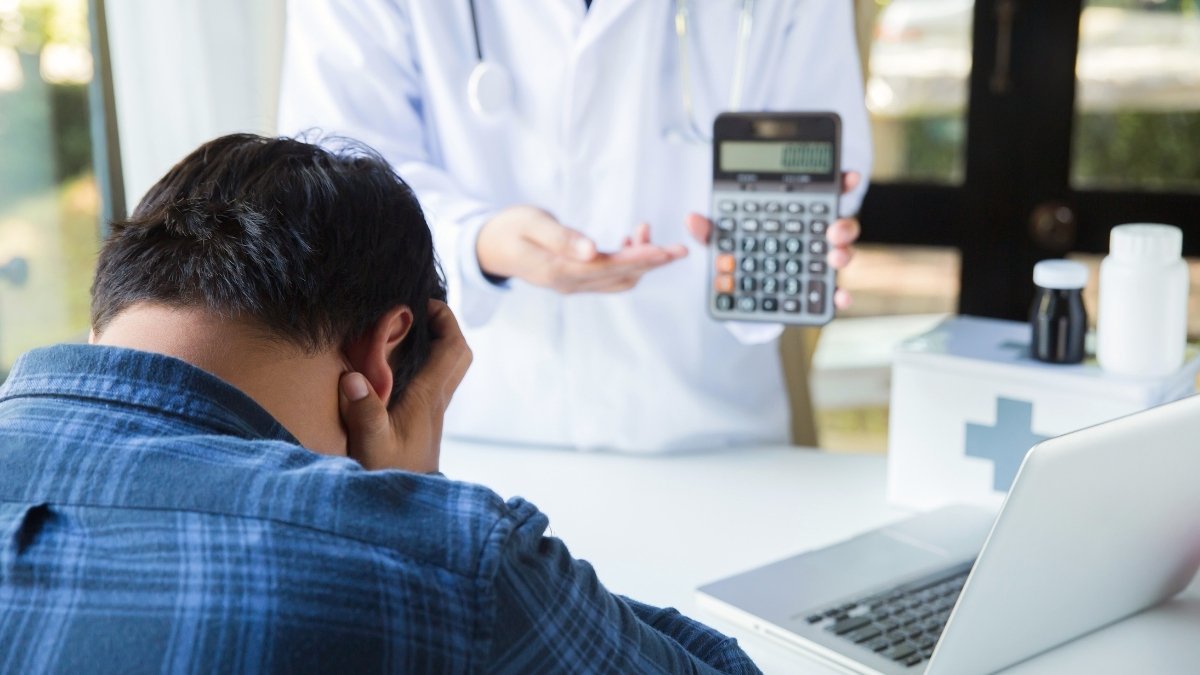
Let’s talk money, because this is where it gets really interesting.
Current anxiety treatment costs:
- Monthly medication: $200
- Therapy sessions: $400/month
- Multiple medication trials over 1-2 years
- Total per patient: $7,200-$14,400
MM120 approach:
- Single treatment: $10,000 (hypothetical pricing)
- Monitoring visits: $1,000-$2,000
- Total per patient: $11,000-$12,000
But here’s the kicker: MM120 actually works for nearly half of the patients.
When you calculate cost-per-successful-treatment, MM120 could be dramatically cheaper than our current approach.
Plus, think about the productivity gains. People are getting their lives back. Returning to work. Contributing to society instead of struggling just to get through each day.
What Happens Next (And Why You Should Care)
MM120 Development Timeline
Industry Pipeline Status
MindMed isn’t stopping here.
Phase 3 trials are underway:
- Two studies on anxiety (440 total patients)
- One study on depression (starting in 2025)
- Results expected by 2026
If these succeed, it would be the first-ever FDA approval of LSD for any medical condition.
This could be the beginning of psychedelic medicine going mainstream.
The Human Story Behind the Numbers

Before we get lost in statistics, let’s remember what this actually means.
Generalized anxiety disorder doesn’t just make you worried. It makes you feel like you’re drowning in your own thoughts. Every day is a battle against racing thoughts, physical tension, and exhausting hypervigilance.
As Dr. David Feifel from UC San Diego put it: “I’ve conducted clinical research studies in psychiatry for over 2 decades… That MM-120 exhibited rapid and robust efficacy, solidly sustained for 12 weeks after a single dose, is truly remarkable.”
Walking into a clinic anxious and walking out… not.
Not managed. Not coping. Actually better.
For 48% of people in this study, that’s exactly what happened.
Why I Think This Time Is Different
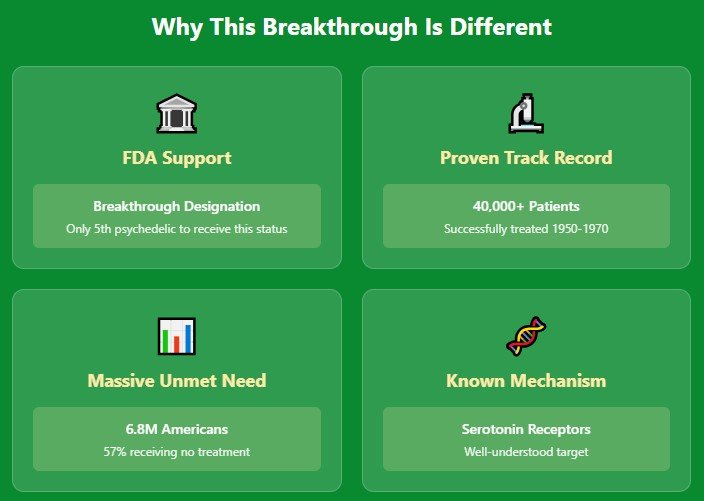
I’ve seen enough “breakthrough” treatments fail to be skeptical.
But here’s what makes me optimistic:
We’ve Been Here Before
LSD worked in clinical settings for decades before politics shut it down. This isn’t unproven territory—it’s picking up where we left off.
The FDA Is Taking It Seriously
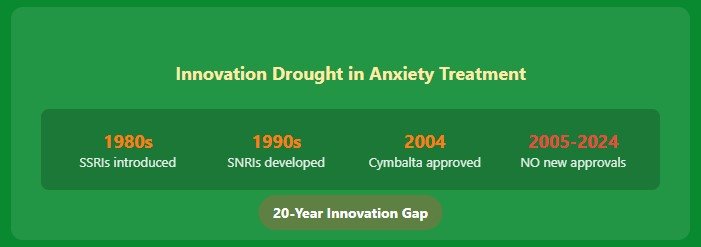
Breakthrough Therapy designation isn’t handed out lightly. The FDA has seen the data and believes this has “substantial improvement over available therapies.”
The Unmet Need Is Massive
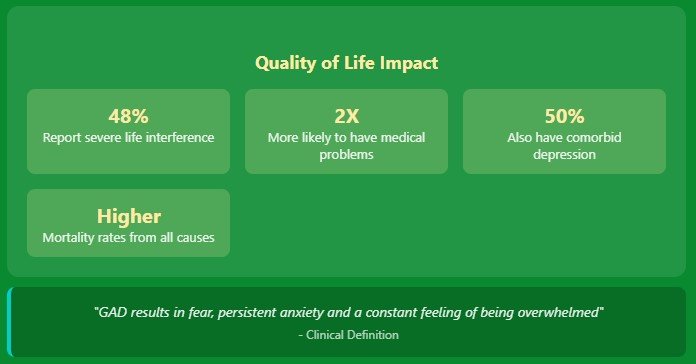
With 6.8 million Americans suffering from GAD and current treatments failing most people, there’s enormous pressure to find better solutions.
The Science Makes Sense
Serotonin receptors are well-understood. The mechanism of action is logical. This isn’t mysterious—it’s pharmacology.
The Bottom Line
MM120: The Game-Changing Numbers
Revolutionary vs. Current Standard
Market Impact Potential
We haven’t had a new anxiety medication approved in over 20 years.
Think about that. In two decades, we’ve revolutionized smartphones, space travel, and artificial intelligence. But anxiety treatment? We’re still using the same tools from the early 2000s.
MindMed’s results represent the biggest breakthrough in anxiety treatment since SSRIs were discovered.
A 48% remission rate from a single dose is unprecedented in psychiatric medicine.
If Phase 3 trials confirm these results, we could be looking at the end of the anxiety medication carousel. No more months of trial and error. No more settling for “good enough.”
Just real relief.
What You Can Do Right Now
Track the progress: MindMed (NASDAQ: MNMD) will be releasing Phase 3 results in 2026. This is worth following.
Stay informed: The psychedelic medicine space is moving fast. Companies like Compass Pathways (psilocybin) and MAPS (MDMA) are also making progress.
Talk to your doctor: While MM120 isn’t available yet, discuss your current treatment. Are you actually getting better, or just managing symptoms?
Don’t give up: If current treatments aren’t working for you, you’re not broken. The treatments are.
The conversation about mental health is changing.
For too long, we’ve accepted that anxiety disorders are something you manage, not something you cure.
MindMed just proved that assumption wrong.
By 2026, we’ll know if this promise becomes reality. For the millions of people living with generalized anxiety disorder, that can’t come soon enough.
What do you think? Are you ready for psychedelic medicine to go mainstream? Or do you think there’s more to this story? Drop a comment below—I’d love to hear your thoughts.






